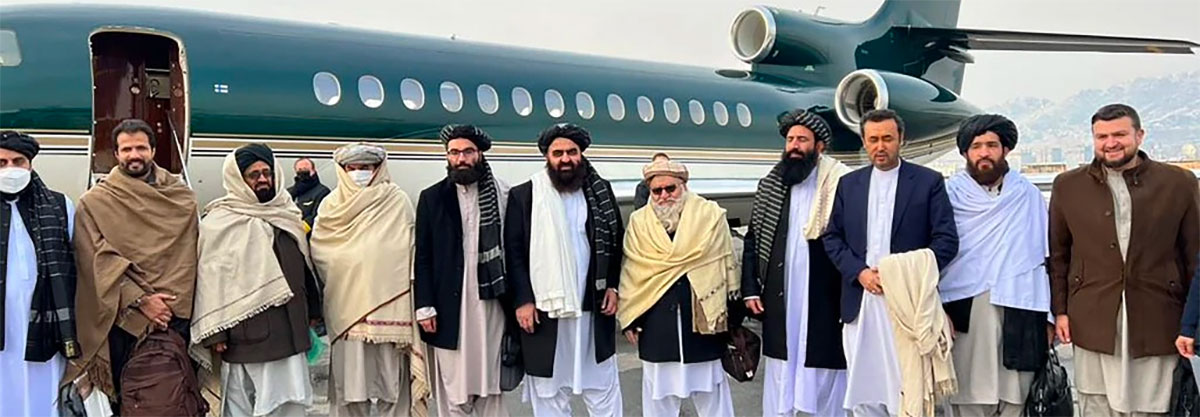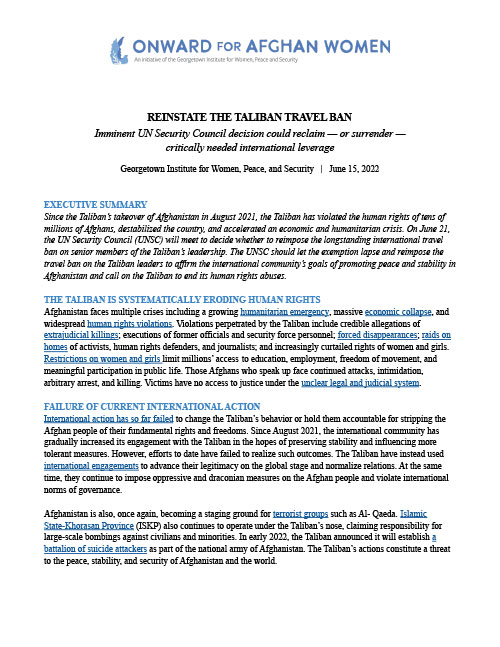
POLICY WHITE PAPER
REINSTATE THE TALIBAN TRAVEL BAN
Imminent UN Security Council decision could reclaim — or surrender — critically needed international leverage
Georgetown Institute for Women, Peace, and Security
June 15, 2022
EXECUTIVE SUMMARY
Since the Taliban’s takeover of Afghanistan in August 2021, the Taliban has violated the human rights of tens of millions of Afghans, destabilized the country, and accelerated an economic and humanitarian crisis. On June 21, the UN Security Council (UNSC) will meet to decide whether to reimpose the longstanding international travel ban on senior members of the Taliban’s leadership. The UNSC should let the exemption lapse and reimpose the travel ban on the Taliban leaders to affirm the international community’s goals of promoting peace and stability in Afghanistan and call on the Taliban to end its human rights abuses.
THE TALIBAN IS SYSTEMATICALLY ERODING HUMAN RIGHTS
Afghanistan faces multiple crises including a growing humanitarian emergency, massive economic collapse, and widespread human rights violations. Violations perpetrated by the Taliban include credible allegations of extrajudicial killings; executions of former officials and security force personnel; forced disappearances; raids on homes of activists, human rights defenders, and journalists; and increasingly curtailed rights of women and girls. Restrictions on women and girls limit millions’ access to education, employment, freedom of movement, and meaningful participation in public life. Those Afghans who speak up face continued attacks, intimidation, arbitrary arrest, and killing. Victims have no access to justice under the unclear legal and judicial system.
FAILURE OF CURRENT INTERNATIONAL ACTION
International action has so far failed to change the Taliban’s behavior or hold them accountable for stripping the Afghan people of their fundamental rights and freedoms. Since August 2021, the international community has gradually increased its engagement with the Taliban in the hopes of preserving stability and influencing more tolerant measures. However, efforts to date have failed to realize such outcomes. The Taliban have instead used international engagements to advance their legitimacy on the global stage and normalize relations. At the same time, they continue to impose oppressive and draconian measures on the Afghan people and violate international norms of governance.
Afghanistan is also, once again, becoming a staging ground for terrorist groups such as Al- Qaeda. Islamic State-Khorasan Province (ISKP) also continues to operate under the Taliban’s nose, claiming responsibility for large-scale bombings against civilians and minorities. In early 2022, the Taliban announced it will establish a battalion of suicide attackers as part of the national army of Afghanistan. The Taliban’s actions constitute a threat to the peace, stability, and security of Afghanistan and the world.
LEVERAGING TRAVEL SANCTIONS
The Taliban view international travel and diplomatic engagement as important to the legitimacy and credibility of their de facto government. UN travel sanctions imposed on Taliban leaders are among the last forms of leverage the international community has left, and the most potent source that does not implicate the Afghan people.
The current Taliban travel ban was partially suspended in 2019 to allow 14 top leaders of the Taliban to engage in peace talks with the United States. The ban’s suspension was intended to facilitate the Taliban leaders’ participation in the peace process and was created for the sole purpose of enabling official travel to engage in peace and stability discussions worldwide. While the peace talks between the Taliban and the United States have ended, the travel exception has continued, despite the Taliban’s failure to respect the central provisions of the agreement.
The current exemption expires on June 20th, presenting the UNSC with an important opportunity. Renewing the travel exception would continue to reward the Taliban and surrender perhaps its greatest form of leverage, while allowing the exemption to expire would create a renewed opportunity for international leaders to exert pressure when it is desperately needed.
Given the grave human rights situation and the Taliban’s willful failure to protect the rights and freedoms of the Afghan people, the UNSC should allow the travel ban exemption to lapse. The UNSC should also form a Taliban Monitoring Committee with a mandate to review Taliban travel requests on a case-by-case basis. Such bodies have precedent at the UN, such as the ISIL (Da’esh) and Al-Qaida Sanctions Committee.
The listed individuals would be required to apply for a travel ban exemption for necessary travel, in line with compliance to several conditions, including:
- Implementation of human rights instruments and institutions, such as the reinstatement of the Afghanistan Independent Human Rights Commission;
- Ensuring women and girls’ full and equal access to education, work, and freedom of movement;
- The formation and support of inclusive delegations, including Afghan women, civil society, and minorities groups; and
- Commitment to reporting to the Monitoring Committee upon completion of travel.
RESPONSE TO CRITICS
Critics skeptical about reimposing the travel ban argue that limiting the Taliban’s travel will hinder humanitarian cooperation, jeopardize their relationship with United Nations Assistance Mission in Afghanistan (UNAMA), and will not be enforceable. While there is certainly a risk, to do otherwise with regard to the travel ban is to give a green light to the Taliban to continue its egregious violations.
Moreover, the Taliban are already interfering with the ability of humanitarian organizations to equitably deliver aid. International attention should focus on channeling humanitarian aid through the local NGOs and women-led organizations who are essential drivers of effective aid distribution, rather than continuing to embolden Taliban leaders.
The international community should not over-index its actions based on concerns of isolating the Taliban, but rather should take measured steps to hold them accountable to realizing a stable future for Afghanistan. If the Taliban can demonstrate they are willing to develop constructive dialogue with all Afghan stakeholders and the international community, with a focus on upholding the fundamental rights and freedoms of the Afghan people, only under such conditions should a ban be potentially lifted.
DOWNLOAD
Click on the image below to download this white paper in PDF format

